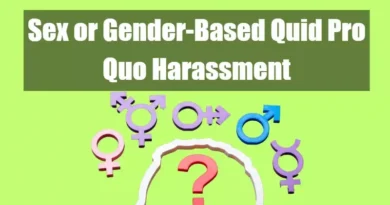Is Quid Pro Quo Harassment a Prophecy? An example
The idea of “quid pro quo harassment” being a prophecy is not a typical or legal concept. The term “prophecy” implies predicting or foretelling the future, which is unrelated to the specific legal framework of quid pro quo harassment. Quid pro quo harassment legally remains a misconduct issue, not a prediction of future events.
A quid pro quo harassment example involves a supervisor offering a promotion in exchange for a romantic or sexual relationship, such as saying, “If you go out with me, I’ll ensure you get that promotion.” This contrasts with a prophecy, which is merely a prediction without actionable demands, like the idea of “prophecy” in business can relate to how predictions or expectations shape reality. For example, a company claiming, “We will become the industry leader next year based on current trends,” resembles a self-fulfilling prophecy. The statement, while speculative, can influence behaviors that make the prediction come true. If stakeholders—like employees, investors, or customers—believe in the company’s forecast, their actions may contribute to its realization. This dynamic often occurs in financial markets where technical analysis or economic forecasts drive behaviors that lead to predicted outcomes, such as stock price changes based on anticipated trends or support levels.
Quid Pro Quo Harassment
“Quid pro quo harassment” is a form of sexual harassment that occurs when job benefits—like promotions, raises, or favorable assignments—are conditioned on an employee submitting to unwelcome sexual advances. For instance, if a manager suggests that an employee will be promoted only if they engage in a sexual relationship, this is a clear example of quid pro quo harassment.
This type of harassment only happens when the person in power, such as a supervisor, can influence the employee’s job situation (e.g., firing, promoting, or giving raises). It involves an abuse of authority and is illegal under employment laws in the U.S.
To further clarify, an example of quid pro quo harassment might involve an employee being told they will lose their job unless they agree to a supervisor’s inappropriate demands. Regardless of whether the employee submits or refuses, this behavior is illegal and can result in legal consequences for the employer.
What is Prophecy?
Prophecy is essentially a message or prediction about future events, often claimed to come from a divine source. It can involve foreseeing what might happen in the future, but it can also address hidden aspects of the present or explain past events that are not widely known. In religious contexts, prophets are individuals believed to receive these messages from a divine power, often conveying guidance, warnings, or promises about what is to come.
While many associate prophecy with predicting future events, it doesn’t always mean predicting something inevitable. For instance, in the Bible, prophets sometimes delivered messages that were conditional—meaning that if people changed their behavior, the predicted outcomes might not occur. This form of prophecy serves more as a warning or call to action rather than an unchangeable forecast.
In a broader sense, prophecy can also be understood as any form of inspired or profound statement that addresses important truths or insights, not strictly related to future events but rather to spiritual or moral teachings.
So, quid pro quo harassment and prophecy are different concepts.









